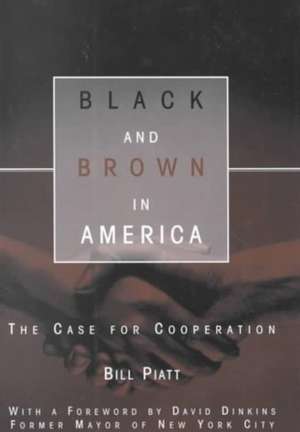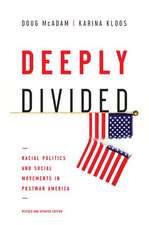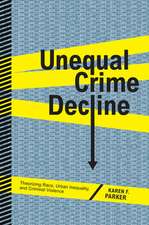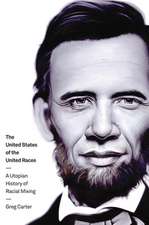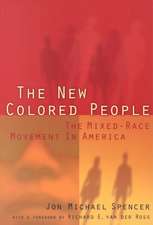Black and Brown in America – The Case for Cooperation: Critical America
Autor William Piatt, David Dinkinsen Limba Engleză Hardback – 31 mar 1997
Din seria Critical America
-
 Preț: 123.12 lei
Preț: 123.12 lei -
 Preț: 256.86 lei
Preț: 256.86 lei -
 Preț: 216.04 lei
Preț: 216.04 lei -
 Preț: 201.62 lei
Preț: 201.62 lei -
 Preț: 223.58 lei
Preț: 223.58 lei - 23%
 Preț: 584.77 lei
Preț: 584.77 lei -
 Preț: 250.89 lei
Preț: 250.89 lei - 23%
 Preț: 525.71 lei
Preț: 525.71 lei -
 Preț: 247.40 lei
Preț: 247.40 lei -
 Preț: 250.89 lei
Preț: 250.89 lei -
 Preț: 239.73 lei
Preț: 239.73 lei -
 Preț: 262.04 lei
Preț: 262.04 lei -
 Preț: 242.01 lei
Preț: 242.01 lei -
 Preț: 242.22 lei
Preț: 242.22 lei -
 Preț: 248.17 lei
Preț: 248.17 lei -
 Preț: 251.27 lei
Preț: 251.27 lei -
 Preț: 241.08 lei
Preț: 241.08 lei -
 Preț: 205.32 lei
Preț: 205.32 lei -
 Preț: 248.59 lei
Preț: 248.59 lei -
 Preț: 247.40 lei
Preț: 247.40 lei -
 Preț: 245.67 lei
Preț: 245.67 lei -
 Preț: 225.71 lei
Preț: 225.71 lei -
 Preț: 224.33 lei
Preț: 224.33 lei -
 Preț: 246.86 lei
Preț: 246.86 lei -
 Preț: 502.77 lei
Preț: 502.77 lei -
 Preț: 242.78 lei
Preț: 242.78 lei -
 Preț: 227.62 lei
Preț: 227.62 lei -
 Preț: 241.85 lei
Preț: 241.85 lei -
 Preț: 227.44 lei
Preț: 227.44 lei -
 Preț: 222.60 lei
Preț: 222.60 lei -
 Preț: 250.67 lei
Preț: 250.67 lei -
 Preț: 236.06 lei
Preț: 236.06 lei -
 Preț: 242.60 lei
Preț: 242.60 lei -
 Preț: 238.96 lei
Preț: 238.96 lei -
 Preț: 226.09 lei
Preț: 226.09 lei -
 Preț: 241.64 lei
Preț: 241.64 lei -
 Preț: 266.07 lei
Preț: 266.07 lei -
 Preț: 206.85 lei
Preț: 206.85 lei -
 Preț: 224.33 lei
Preț: 224.33 lei -
 Preț: 237.22 lei
Preț: 237.22 lei -
 Preț: 210.16 lei
Preț: 210.16 lei -
 Preț: 242.22 lei
Preț: 242.22 lei -
 Preț: 294.42 lei
Preț: 294.42 lei -
 Preț: 209.17 lei
Preț: 209.17 lei - 23%
 Preț: 533.56 lei
Preț: 533.56 lei
Preț: 521.57 lei
Preț vechi: 677.37 lei
-23% Nou
Puncte Express: 782
Preț estimativ în valută:
99.81€ • 102.22$ • 83.03£
99.81€ • 102.22$ • 83.03£
Carte tipărită la comandă
Livrare economică 18 martie-01 aprilie
Preluare comenzi: 021 569.72.76
Specificații
ISBN-13: 9780814766453
ISBN-10: 0814766455
Pagini: 216
Dimensiuni: 127 x 203 x 15 mm
Greutate: 0.36 kg
Ediția:New.
Editura: MI – New York University
Seria Critical America
ISBN-10: 0814766455
Pagini: 216
Dimensiuni: 127 x 203 x 15 mm
Greutate: 0.36 kg
Ediția:New.
Editura: MI – New York University
Seria Critical America
Recenzii
“This fresh and significant scholarship should be of great interest to students of race in the Americas, the African diaspora, borderland studies, comparative empires and anyone drawn to insightful, thought-provoking historical writing.”
—Hispanic American Historical ReviewAlways fascinating, often brilliant.
Diplomatic History Hornes study raises thorny yet critical questions and offers a nuanced reading of both black emigrants and soldiers, cautioning against an overly romanticized vision of either group. Readers interested in the history of black mens military participation and the broader history of American social and political history in the First World War era will find this book a welcome addition to the literature.
Social History "Horne tells this story in expert fashion...The book's strengths lie in its thick description of how perceptions about the revolution affected black-white relations in the United States, an achievement that points the way toward a better understanding of civil rights history in the context of international relations."
The Journal of American History
"This fresh and significant scholarship should be of great interest to students of race in the Americas, the African diaspora, borderland studies, comparative empires and anyone drawn to insightful, thought-provoking historical writing." -Hispanic American Historical ReviewAlways fascinating, often brilliant. --Diplomatic History Hornes study raises thorny yet critical questions and offers a nuanced reading of both black emigrants and soldiers, cautioning against an overly romanticized vision of either group. Readers interested in the history of black mens military participation and the broader history of American social and political history in the First World War era will find this book a welcome addition to the literature. -- Social History "Horne tells this story in expert fashion...The book's strengths lie in its thick description of how perceptions about the revolution affected black-white relations in the United States, an achievement that points the way toward a better understanding of civil rights history in the context of international relations." --The Journal of American History
—Hispanic American Historical ReviewAlways fascinating, often brilliant.
Diplomatic History Hornes study raises thorny yet critical questions and offers a nuanced reading of both black emigrants and soldiers, cautioning against an overly romanticized vision of either group. Readers interested in the history of black mens military participation and the broader history of American social and political history in the First World War era will find this book a welcome addition to the literature.
Social History "Horne tells this story in expert fashion...The book's strengths lie in its thick description of how perceptions about the revolution affected black-white relations in the United States, an achievement that points the way toward a better understanding of civil rights history in the context of international relations."
The Journal of American History
"This fresh and significant scholarship should be of great interest to students of race in the Americas, the African diaspora, borderland studies, comparative empires and anyone drawn to insightful, thought-provoking historical writing." -Hispanic American Historical ReviewAlways fascinating, often brilliant. --Diplomatic History Hornes study raises thorny yet critical questions and offers a nuanced reading of both black emigrants and soldiers, cautioning against an overly romanticized vision of either group. Readers interested in the history of black mens military participation and the broader history of American social and political history in the First World War era will find this book a welcome addition to the literature. -- Social History "Horne tells this story in expert fashion...The book's strengths lie in its thick description of how perceptions about the revolution affected black-white relations in the United States, an achievement that points the way toward a better understanding of civil rights history in the context of international relations." --The Journal of American History
